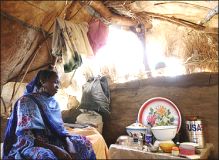Darfur displaced feel secure in one government camp
By Opheera McDoom
AL-SUREIF CAMP, Sudan, Dec 17 (Reuters) – Driving through the slum suburbs of South Darfur’s main town Nyala, a sea of large white tents loomed over the horizon, spread out evenly in neat rows.

|
|
A Sudanese woman sits on a bed inside her tent in the Kalma camp for internally displaced persons on the outskirts of the southern Darfur town of Nyala.. (AFP) |
The government-built camp of al-Sureif, 10 km (6 miles) west of Nyala, houses some 9,000 Darfuris who fled their homes during a 22-month-old rebellion in the remote west of Sudan. The inhabitants say they are happier there than in other camps and feel secure.
But the history of al-Sureif was not all calm. Last month, military police surrounded al-Jeer camp on the outskirts of Nyala and moved the displaced population to al-Sureif. When some refused to go, the mood turned violent with police beating people and using tear gas.
“It was chaos. The police were chasing and beating people,” said Halima Eissa Ahmed. “But it’s much better here — there’s no attacks.”
Ali Hassan, 52, said he felt secure in al-Sureif but that he was hungry.
“In al-Jeer the police themselves attacked us and used to beat us,” he declared, waving his long arms. “Here there is good security but there’s no food,” he said, pointing to his stomach.
“FOOD, FOOD”
A crowd of women wrapped in colourful shawls gathered, all shouting “food, food” and making eating motions. “The foreigners over there … the organisations, they were very good and gave us food,” Hassan said. “Here we get little food. Where are the foreigners?” he demanded.
The Saudi Red Crescent works in al-Sureif. Friday was food distribution day, but many said they still had no cards to get food.
“It takes time for the organisation to get them registered, give them a tent and then get a food card,” said camp manager Ahmed Ali. He said other organisations had promised to come and set up operations in the camp.
Unlike many other camps for the more than 1.6 million displaced in Darfur, where the government officials are hated and even attacked, Ali walked around the camp population freely and relaxed, stopping to chat with the families.
He said the camp, equipped with water tanks and pumps, took three months to set up and was expanding. It should have the capacity to hold 18,000 people by the end of the year. But it was growing everyday as more displaced fled the fighting in South Darfur, currently the most troubled area of the remote region.
After years of tribal conflict over scarce resources in arid Darfur, rebels took up arms early last year accusing the Khartoum government of neglect and of using Arab militias, known as Janjaweed, to loot and burn non-Arab villages and drive them off their land.
Khartoum admits mobilising some militias to fight the rebels, but it denies any links to the Janjaweed, branding them bandits.
ARAB REFUGEES
Zahra Hamid has not seen her husband since the day her town of Buram, south of Nyala, was attacked. She ran away to Nyala with her seven children and moved to al-Sureif a few weeks ago.
Unabashed she began breast feeding her youngest son and bemoaned her helpless situation. “We have to send them to school, but we have no money,” she said.
Unlike the majority of the displaced in Darfur’s hundreds of camps, Hamid is from an Arab tribe and Buram is an Arab town.
While in many of Darfur’s camps, the word Arab has become synonymous with Janjaweed, Hamid and about 20 other families live in peace among her non-Arab neighbours.
“I’m amazed they don’t give her any trouble,” said one aid worker in the camp. “These people hate the Arabs and think they are all evil.”
But Hamid’s fellow displaced live with similar problems and have no time for hate.
“We want the government to return the security so that we can go back,” said Fatma Eissa Salih. She says helicopters and an Antonov plane bombed her village, killing countless people. Then Janjaweed rode in on camels and horses and looted all her belongings.
“All I want from them is for them to give me back my cattle,” she said.
